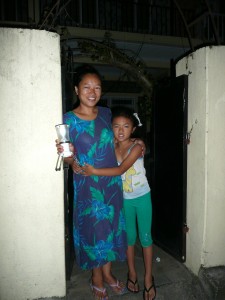Mahabir Pun’s mother, Purbi, gave birth to two more children after returning to Nangi from Malaysia. She continued to live in Nangi with the five younger siblings when Kisna and Mahabir moved to Chitwan in 1968. Two years later she followed with the rest of the children. Purbi had six children total, with Mahabir being the oldest. Her youngest son died in a motorcycle accident several years ago but otherwise all her children are living. She now lives with her daughters spending some time at each home. She is strong and sharp minded according to Mahabir: “She has very strong will to live longer because even after the doctors had quit hope for her, she recovered from her health problem several times and doing good. She needs to go to the hospital frequently, but she is fighting very hard for her life and always recovering.”
She supported the move to Chitwan despite being separated from her husband because Mahabir was able to attend the 9th and 10th grades. These grades were not available in the Nangi area during the 1960s. She knew there were trained teachers capable of advanced teaching; actual textbooks for the students; and more students to stimulate his mind. The Chitwan area was newly settled due to advances in malaria eradication and it was thought to be a more progressive area. People were moving there in droves for a better life and this included demands for more education for their children. She also knew her husband could farm with his relatives and continue to earn a living.
When I asked Mahabir if he thought that had been a hard time for his mother he simply shrugged his shoulders and said, “Nepali women are used to that”. Perhaps she was used to the separation from his father’s army days or perhaps she accepted it simply as what needed to be done to educate her son and his siblings. Or maybe Mahabir was thinking about his own wife and their long separations due to his work and travels. No matter the reasons, Purbi lives as an example of the tenacity of all Nepali women when faced with tough choices and challenging living conditions.
Have you ever had a tough decision to make that caused a separation of your family unit? Share your story with our readers by clicking on the speech bubble in the upper right hand corner and leaving a comment. Return next week to hear more abour Mahabir Pun’s early school experiences.

